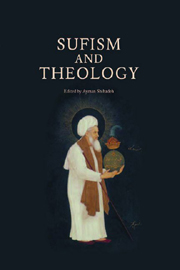Book contents
- Frontmatter
- Contents
- Contributors
- Acknowledgements
- Introduction
- Part I Mystical Theologies
- Part II Theological Approaches to Sufism
- 6 The Mystic and the Sceptic in Fakhr al-Dīn al-Rāzī
- 7 Ibn Taymiyya's Commentary on the Creed of al-Ḥallāj
- 8 Ibn Kemāl (d. 940/1534) on Ibn 'Arabī's Hagiology
- 9 Scriptural Sufism and Scriptural Anti-Sufism: Theology and Mysticism amongst the Shī'ī Akhbāriyya
- 10 Reconciling Sufism with Theology: Abū l-Wafā al-Taftāzānī and the Construct of ‘al-Taṣawwuf al-Islāmī’ in Modern Egypt
- Index
7 - Ibn Taymiyya's Commentary on the Creed of al-Ḥallāj
from Part II - Theological Approaches to Sufism
Published online by Cambridge University Press: 12 September 2012
- Frontmatter
- Contents
- Contributors
- Acknowledgements
- Introduction
- Part I Mystical Theologies
- Part II Theological Approaches to Sufism
- 6 The Mystic and the Sceptic in Fakhr al-Dīn al-Rāzī
- 7 Ibn Taymiyya's Commentary on the Creed of al-Ḥallāj
- 8 Ibn Kemāl (d. 940/1534) on Ibn 'Arabī's Hagiology
- 9 Scriptural Sufism and Scriptural Anti-Sufism: Theology and Mysticism amongst the Shī'ī Akhbāriyya
- 10 Reconciling Sufism with Theology: Abū l-Wafā al-Taftāzānī and the Construct of ‘al-Taṣawwuf al-Islāmī’ in Modern Egypt
- Index
Summary
The great Damascene theologian Ibn Taymiyya (d. 728/1328) is often presented as an extremist, with many dire, radical positions attached to his name. In the domain of politics, he is unjustly regarded by some as the spiritual ancestor of the kind of extremism associated with Usāma bin Lādin, the source of ‘a long tradition of extreme intolerance within one stream of Islam’. The situation is not much better in regard to philosophy – being the author of the Refutation of the Logicians (al-Radd 'alā l-manṭiqiyyīn), he is generally seen as an arch-enemy of the falāsifa. This image of him is likewise a grave distortion. Shams al-Dīn al-Dhahabī (d. 748/1348) was closer to the truth when he accused Ibn Taymiyya of having ‘repeatedly swallowed the poison of the philosophers and of their works’. One ought to remember too that he not only commented on Avicenna's Risāla Aḍḥawiyya, on Averroes and several other Muslim thinkers, but also on the Abridgement (talkhīṣ) of Aristotle's Metaphysics by Thābit ibn Qurra.
Quid about mysticism? Ibn Taymiyya surely wrote many fatwas and other texts condemning the deviant or suspect ideas and practices of the Sufis of his time. Nevertheless, rather than being an unconditional opponent of Sufism, he used to show great respect for the early spiritual masters of Islam, was quite probably himself a Qādirī, and composed commentaries on various Sufi texts. Th. Michel has written a study of one of these commentaries, the sharḥ on Abd al-Qādir al-Jīlānī's Futūh al-ghayb. The present chapter has to do with Ibn Taymiyya's commentary on the Creed ('aqīda) of the famous Sufi executed in Baghdād in 309/922, al-Ḥusayn ibn Manṣūr al-Ḥallāj.
- Type
- Chapter
- Information
- Sufism and Theology , pp. 123 - 136Publisher: Edinburgh University PressPrint publication year: 2007

